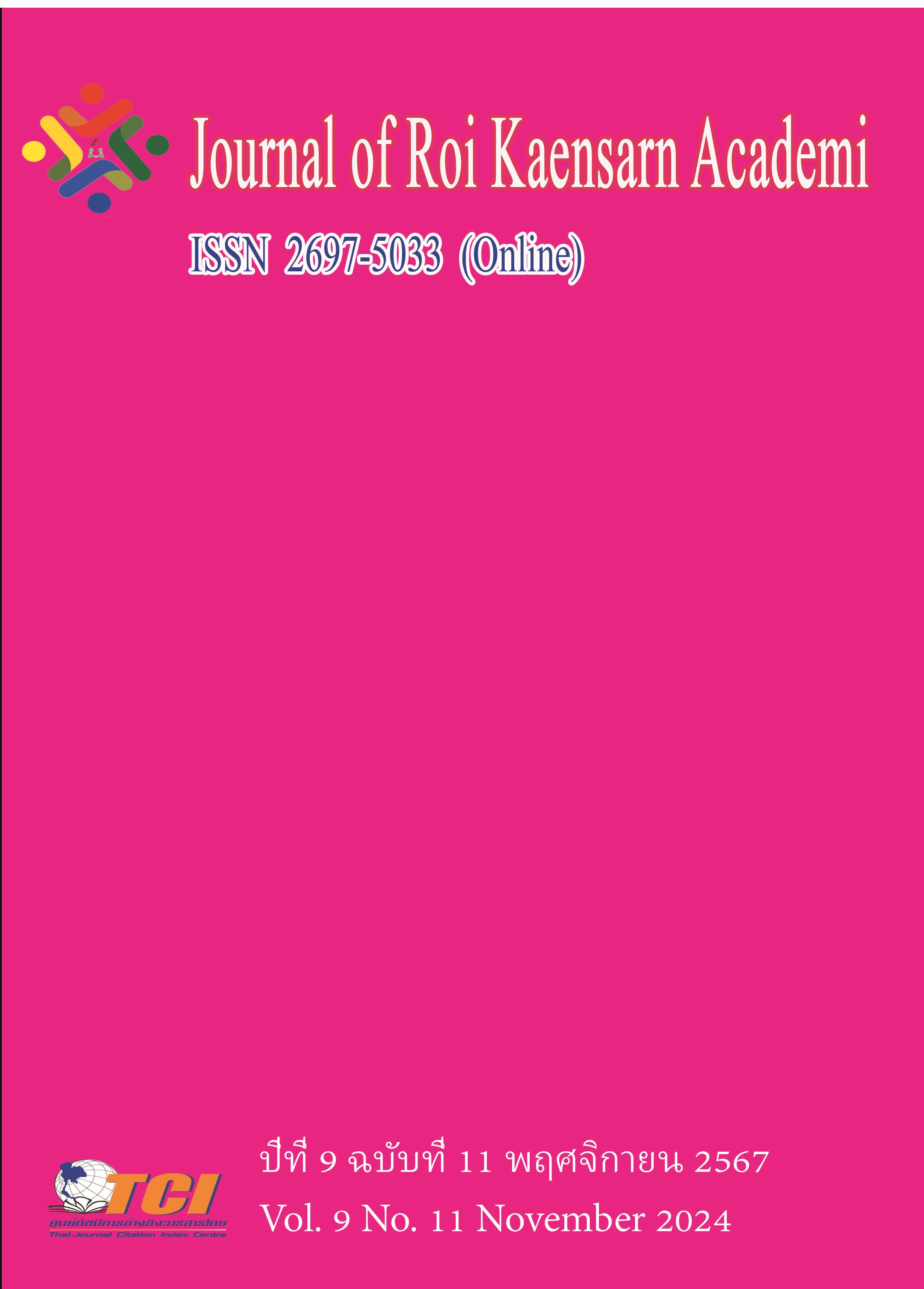The Analysis Causal Model of Social Media Management Strategies on Organizational Performance of Small listed Enterprises in China with Customer Engagement as a Mediator
Main Article Content
บทคัดย่อ
In the context of the rapid development of social media in today's era,This paper primarily examines the impact of social media management strategies on organizational performance in small listed enterprises in China through the mediating role of customer engagement. The research employs a mixed-methods approach, combining quantitative and qualitative methods. First, in the quantitative research, data from 400 survey questionnaires were collected from 34 small listed enterprises across five regions in China (East China, South China, West China, and North China). The researchers used SPSS 26.0 and Amos 24.0 software to conduct reliability and validity analyses, which included data preprocessing, descriptive statistical analysis, reliability analysis, structural validity analysis, convergent validity analysis and correlation analysis, then constructed a Structural Equation Model (SEM). The hypothesis testing through the model revealed the following findings: 1) Social media management strategies have a positive indirect effect on organizational performance through customer engagement (0.946); 2) Customer engagement has a moderate direct effect on organizational performance (0.366); 3) Social media management strategies have a positive direct effect on organizational performance (0.649). Secondly, in the qualitative research, in-depth interviews were conducted with executives from 10 listed enterprises in five regions of China, and the interview results further validated the conclusions of the qualitative analysis. The findings provide new insights for small listed enterprises in China to enhance organizational performance and customer engagement, and offer new ideas for other enterprises to formulate social media management strategies in the future.
Article Details
เอกสารอ้างอิง
Chung, K. C., Chen, C. H., Tsai, H. H., & Chuang, Y. H. (2021). Social media privacy management strategies: A SEM analysis of user privacy behaviors. Computer Communications, 174, 122-130. doi:10.1016/j.comcom.2021.04.012
Cottrill, C., Gault, P., Yeboah, G., Nelson, J. D., Anable, J., & Budd, T. (2017). Tweeting Transit: An examination of social media strategies for transport information management during a large event. Transportation Research Part C-Emerging Technologies, 77, 421-432. doi:10.1016/j.trc.2017.02.008
Dogan-Sudas, H., Kara, A., Cabuk, S., & Kaya, K. (2022). Social Media Customer Relationship Management and Business Performance: Empirical Evidence from an Emerging Market. Studies in Business and Economics, 17 (2), 90-107. doi:10.2478/ sbe-2022-0027
Elena, C. A. (2016). Social Media – A Strategy in Developing Customer Relationship Management. Procedia Economics and Finance, 39, 785-790. doi:10.1016/s2212-5671 (16)30266-0
Fitriani, N., Setiawan, D., Aryani, Y. A., & Arifin, T. (2023). Does social media affect performance in e-commerce business? The role of customer management. Journal of Open Innovation: Technology, Market, and Complexity, 9 (4). doi:10.1016/j.joitmc. 2023.100171
Fu Yanfei. (2023). The effect of social media use on employee Job performance: The mediating role of job engagement and job burnout. (Master), Retrieved from https://link.cnki.net/doi/10.27441/d.cnki.gyzdu.2023.002030 Available from Cnki
Kulikovskaja, V., Hubert, M., Grunert, K. G., & Zhao, H. (2023). Driving marketing outcomes through social media-based customer engagement. Journal of Retailing and Consumer Services, 74. doi:10.1016/j.jretconser.2023.103445
Lau, W. W. F. (2017). Effects of social media usage and social media multitasking on the academic performance of university students. Computers in Human Behavior, 68, 286-291. doi:10.1016/j.chb.2016.11.043
Lei, S. S. I., Pratt, S., & Wang, D. (2016). Factors influencing customer engagement with branded content in the social network sites of integrated resorts. Asia Pacific Journal of Tourism Research, 22(3), 316-328. doi:10.1080/10941665.2016.1250792
Liu Jingyan, & Liu Xingyan. (2022). Study on the influence of customer engagement on service innovation performance of tourism e-commerce platform -- mediated by knowledge transfer. Statistical theory and practice. (02), 57-64.
Liu, Z., Geng, R., Tse, Y. K., & Han, S. (2023). Mapping the relationship between social media usage and organizational performance: A meta-analysis. Technological Forecasting and Social Change, 187. doi:10.1016/j.techfore.2022.122253
Martín-Rojas, R., Garrido-Moreno, A., & García-Morales, V. J. (2023). Social media use, corporate entrepreneurship and organizational resilience: A recipe for SMEs success in a post-Covid scenario. Technological Forecasting and Social Change, 190. doi:10.1016/j.techfore.2023.122421
Meidute-Kavaliauskiene, I., Davidaviciene, V., Karakaya, G., & Ghorbani, S. (2021). The Measurement of Organizational Social Media Integration Impact on Financial and Innovative Performance: An Integrated Model. Sustainability, 13(18). doi:ARTN 1039710.3390/su131810397
Ndung'u, J., Vertinsky, I., & Onyango, J. (2023). The relationship between social media use, social media types, and job performance amongst faculty in Kenya private universities. Heliyon. doi:10.1016/j.heliyon.2023.e22946
Park, Y. E. (2022). Developing a COVID-19 Crisis Management Strategy Using News Media and Social Media in Big Data Analytics. Social Science Computer Review, 40(6), 1358-1375. doi:Artn 0894439321100731410.1177/08944393211007314
Parveen, F., Jaafar, N. I., & Ainin, S. (2016). Social media’s impact on organizational performance and entrepreneurial orientation in organizations. Management Decision, 54(9), 2208-2234. doi:10.1108/md-08-2015-0336
Qalati, S. A. (2021). Research on the factors influencing the adoption of social media by smes in developing countries and its impact on their performance. (Doctor), Retrieved from https://link.cnki.net/doi/10.27170/d.cnki.gjsuu.2021.001113 Available from Cnki
Shah, S. A., Shoukat, M. H., Ahmad, M. S., & Khan, B. (2021). Role of social media technologies and customer relationship management capabilities 2.0 in creating customer loyalty and university reputation. Journal of Marketing for Higher Education, 1-24. doi:10.1080/08841241.2021.1991072
Shi Fangfang. (2020). The influence of customer participation on service innovation performance in human resource service industry: the mediating role of employee innovation behavior and the moderating role of organizational innovation climate. Western Economic Management Forum. 31 (03), 36-48.
Willis, E. A., Szabo-Reed, A. N., Ptomey, L. T., Steger, F. L., Honas, J. J., Al-Hihi, E. M., . . . Donnelly, J. E. (2016). Distance learning strategies for weight management utilizing social media: A comparison of phone conference call versus social media platform. Rationale and design for a randomized study. Contemporary Clinical Trials, 47, 282-288. doi:10.1016/j.cct.2016.02.005
Xu, Y., Chen, W., & Ow, T. T. (2023). The effects of social media posts’ characteristics on customer engagement: Evidence from WeChat. Information & Management, 60 (7). doi:10.1016/j.im.2023.103854
Zhang Jie, & Cai Hong. (2020). The effects of customer engagement on new product development performance in virtual communities: the moderating role of virtual social capital. Scientific and technological progress and countermeasures , 37 (07), 16-25.

